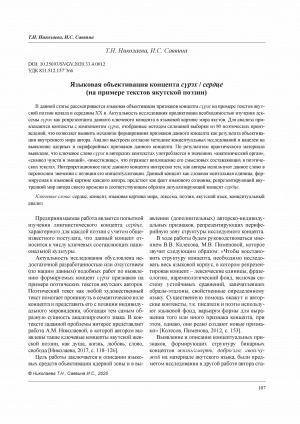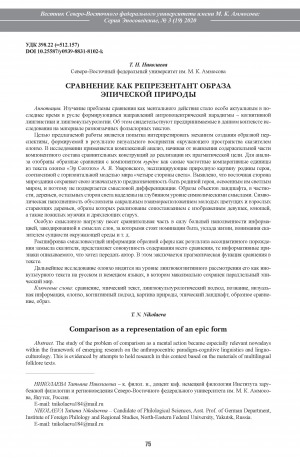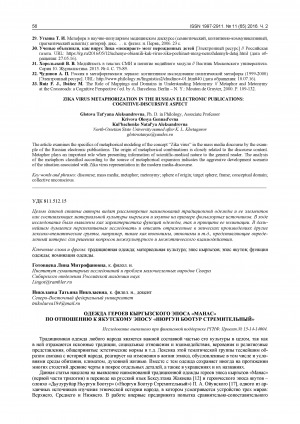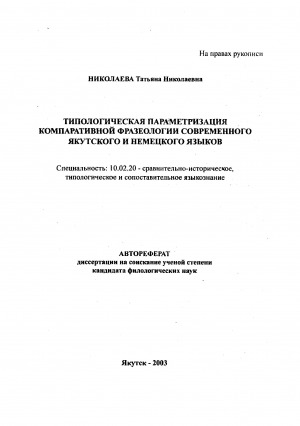Место работы автора, адрес/электронная почта: Северо-Восточный федеральный университет им. М. К. Аммосова, Институт зарубежной филологии и регионоведения ; 677013, г. Якутск, ул. Белинского, 58 ; e-mail: tn.nikolaeva@s-vfu.ru, tnikolaeva184@mail.ru ; https://www.s-vfu.ru/
Ученая степень, ученое звание: канд. филол. наук
Область научных интересов: Сравнительное и сопоставительное языкознание
ID Автора: SPIN-код: 4190-4945, РИНЦ AuthorID: 612931
Деятельность: В 1978-1983 - учитель немецкого языка, заместитель директора по учебно-воспитательной работе Саккырырской средней школы Верхоянского района.
Источник: Вестник Северо-Восточного федерального университета им. М. К. Аммосова. Серия "Эпосоведение". - 2025. - N 1 (37)
Количество страниц: 11 с.
This article is devoted to the identification of human age characteristics in Yakut riddles with the involvement of similar units of Tuvan, Altai and Khakas languages. The relevance of the study of this problem is connected with the prospect of comparative study of the phenomenon of riddle texts from the point of view of a comprehensive study of a small genre of folklore in different cultures in the context of modern linguistic trends (cognitive linguistics, linguocultural studies, folkloristics). In the work the following methods are applied: the method of solid sampling, linguocultural and interpretative analysis. The material for analysis is extracted by the method of solid sampling from collections of folk riddles, from the works of individual authors, provided with a translation into Russian “line by line” for the convenience of work. The aim of the work is to identify and describe the universal and national-specific representations of the human life cycle, veiled allegorically in enigmatic texts. The study reveals that in these texts indirect nominations of the enigmatic denotation are possible in different structural constructions, the design of which depends on the intention of the addresser and the addressee. It is also revealed that riddles with a multi-part structure encode a metaphorical image of a person in age transformations from birth to the last days. In riddles with a two-part structure, the course of a person’s life development is represented as an instantaneous change of daily time (morning>day>evening). This metamorphosis of time is found in the riddle about a man, which turned out to be universal for the considered linguocultural communities. As the material shows, the enigmatic description of the object is presented in Yakut examples in actional, temporal and digital codes, and in the Turkic languages under consideration – in zoomorphic, digital, artifactual and social codes, since the enigmatic texts contain information that reflects the linguocultural picture of the world to which they belong, their deciphering, unraveling is based on cleverness, life experience, knowledge, ideas about the surrounding world. The prospect of further work is seen in a more detailed and in-depth understanding of the nature of folk and modern riddles in order to identify the dynamics of perception of the image of a person on the material of related languages.
Количество страниц: 8 с.
Николаева, Т. Н. Языковая объективация концепта сүрэх/сердце (на примере текстов якутской поэзии) = The Language Objectification of the Concept Syurekh (Heart) (on the Example of the Yakut Poetry Texts) / Т. Н. Николаева, И. С. Саввина // Северо-Восточный гуманитарный вестник. — 2020. — N 4 (33). — C. 107-114. — DOI: 10.25693/SVGV.2020.33.4.0012.
DOI: 10.25693/SVGV.2020.33.4.0012
Comparison as a representation of an epic form
Количество страниц: 12 с.
- Языкознание. Филология. Художественная литература > Языкознание и языки. Лингвистика > Якутский (саха),
- Общественные науки. Образование > Фольклор,
- НАУКА ЯКУТИИ > ОБЩЕСТВЕННЫЕ НАУКИ > Фольклор,
- НАУКА ЯКУТИИ > ЯЗЫКОЗНАНИЕ. ФИЛОЛОГИЯ. ЛИТЕРАТУРОВЕДЕНИЕ. ХУДОЖЕСТВЕННАЯ ЛИТЕРАТУРА > Языкознание и языки. Лингвистика.
Николаева, Т. Н. Сравнение как репрезентант образа эпической природы / Т. Н. Николаева // Вестник Северо-Восточного федерального университета им. М. К. Аммосова. Серия "Эпосоведение" - 2020, N 3 (19). - С. 75-85.
DOI: 10.25587/y0939-8831-8102-k
Количество страниц: 6 с.
- Якутия - Кыргызстан: взаимосвязь истории и культур,
- Якутский героический эпос Олонхо > Научные труды,
- Общественные науки. Образование > Этнография. Обычаи. Жизнь народа. Нравы,
- Языкознание. Филология. Художественная литература > Языкознание и языки. Лингвистика > Якутский (саха),
- Общественные науки. Образование > Фольклор,
- Языкознание. Филология. Художественная литература > Языкознание и языки. Лингвистика > Тюркские языки,
- НАУКА ЯКУТИИ > ОБЩЕСТВЕННЫЕ НАУКИ > Этнография. Обычаи. Жизнь народа. Нравы,
- НАУКА ЯКУТИИ > ОБЩЕСТВЕННЫЕ НАУКИ > Фольклор,
- НАУКА ЯКУТИИ > ЯЗЫКОЗНАНИЕ. ФИЛОЛОГИЯ. ЛИТЕРАТУРОВЕДЕНИЕ. ХУДОЖЕСТВЕННАЯ ЛИТЕРАТУРА > Языкознание и языки. Лингвистика.
Готовцева, Л. М. Одежда героев кыргызского эпоса "Манас" по отношению к якутскому эпосу "Нюргун Боотур Стремительный" / Л. М. Готовцева, Т. Н. Николаева // Филологические науки. Вопросы теории и практики. – 2016, N 11 (65), ч. 2. - С. 56-60.
Год выпуска: 2003
- Авторефераты диссертаций > Филологические науки,
- Саха тыла/Якутский язык > Научные труды по якутскому языку > Фразеология,
- Саха тыла/Якутский язык > Научные труды по якутскому языку > Взаимодействие якутского языка с другими языками,
- Языки народов Якутии > Якутский язык > Научные труды по якутскому языку > Взаимодействие якутского языка с другими языками,
- Языки народов Якутии > Якутский язык > Научные труды по якутскому языку > Фразеология,
- Языкознание. Филология. Художественная литература.




